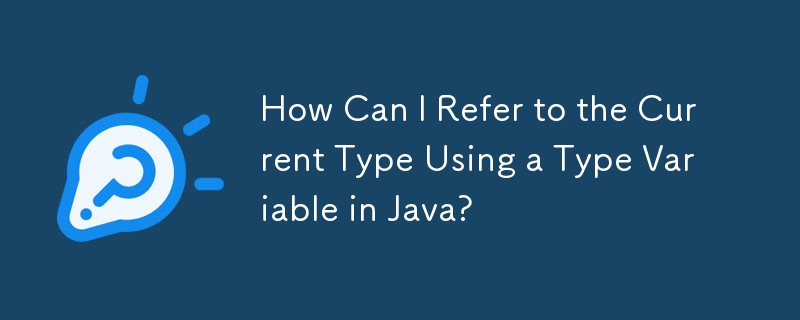
현재 유형의 인스턴스를 반환하는 함수를 만듭니다. 유형 변수 T가 정확한 하위 유형을 참조하도록 하는 방법이 있습니까(따라서 T는 클래스 B의 B를 참조해야 함)?
class A {
<T extends A> void foo();
}
class B extends A {
@Override
T foo();
}StriplingWarrior의 응답을 기반으로 하려면 다음 디자인이 필요합니다(계층적 유창 빌더 API의 공식):
첫 번째, 추상 기본 클래스(또는 인터페이스) 클래스를 확장하는 인스턴스의 런타임 유형을 검색하기 위한 계약을 설정합니다.
/**
* @param <SELF> The runtime type of the implementer.
*/
abstract class SelfTyped<SELF extends SelfTyped<SELF>> {
/**
* @return This instance.
*/
abstract SELF self();
}중간 확장 클래스는 추상이어야 하며 재귀 유형 매개변수 SELF를 유지해야 합니다.
public abstract class MyBaseClass<SELF extends MyBaseClass<SELF>>
extends SelfTyped<SELF> {
MyBaseClass() { }
public SELF baseMethod() {
//logic
return self();
}
}파생된 클래스 추가로 동일한 패턴을 따를 수 있습니다. 그러나 이러한 클래스 중 어느 것도 원시 유형이나 와일드카드를 사용하지 않고는 변수 유형으로 직접 활용될 수 없습니다(이는 패턴의 목적을 훼손합니다). 예를 들어(MyClass가 추상이 아닌 경우):
//wrong: raw type warning
MyBaseClass mbc = new MyBaseClass().baseMethod();
//wrong: type argument is not within the bounds of SELF
MyBaseClass<MyBaseClass> mbc2 = new MyBaseClass<MyBaseClass>().baseMethod();
//wrong: no way to correctly declare the type, as its parameter is recursive!
MyBaseClass<MyBaseClass<MyBaseClass>> mbc3 =
new MyBaseClass<MyBaseClass<MyBaseClass>>().baseMethod();이것이 이러한 클래스를 "중급"이라고 부르는 이유이며 모두 추상으로 선언해야 하는 이유입니다. 루프를 완료하고 상속된 유형 매개변수 SELF를 해당 유형으로 확인하고 self()를 구현하는 패턴을 사용하려면 "리프" 클래스가 필요합니다. 계약 위반을 방지하려면 최종으로 표시해야 합니다.
public final class MyLeafClass extends MyBaseClass<MyLeafClass> {
@Override
MyLeafClass self() {
return this;
}
public MyLeafClass leafMethod() {
//logic
return self(); //could also just return this
}
}이러한 클래스를 사용하면 패턴을 사용할 수 있습니다.
MyLeafClass mlc = new MyLeafClass().baseMethod().leafMethod(); AnotherLeafClass alc = new AnotherLeafClass().baseMethod().anotherLeafMethod();
이것의 주요 장점은 메서드 호출이 동일한 특정 반환 유형을 유지하면서 클래스 계층 구조를 위아래로 연결합니다.
위 내용은 Java에서 유형 변수를 사용하여 현재 유형을 어떻게 참조할 수 있습니까?의 상세 내용입니다. 자세한 내용은 PHP 중국어 웹사이트의 기타 관련 기사를 참조하세요!